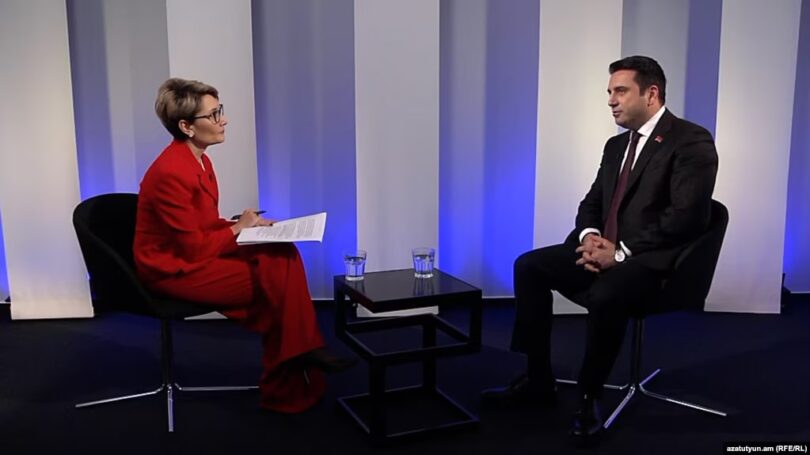In a Radio Liberty interview (English) with Speaker of the Armenian Parliament Alen Simonyan, published on October 19, 2024, Simonyan stated Azerbaijan’s claims on Nagorno Karabakh have their basis in international law. He stated:
“Attacking Karabakh and occupying territories from Armenia are different things from the point of view of law. Azerbaijan carried out an operation in Karabakh, under which it had at least 3-4 UN resolutions.”
None of these United Nations Security Council resolutions condone any Azerbaijani “operations” resulting in the near starvation, ethnic cleansing of the Armenians of Nagorno-Karabakh, and subsequent cultural destruction.
There has been some consternation in Armenia and its diaspora regarding Simonyan’s statements, but mainly outrage at Simonyan’s apparent rationalization of Azerbaijan’s conquest of Nagorno-Karabakh. While Azerbaijan’s conquest of Nagorno-Karabakh appears complete, it currently militarily occupies well over 200 sq km of Armenian territory. One needs to read these UNSC resolutions; apparently, Simonyan has not, nor have those in bewilderment of Simonyan’s claims.
The resolutions in question are numbers: 822, 853, 874, 884.
UNSC Res 822: … refers to the withdrawal of local occupying forces troops from Kelbajar region of the Republic of Azerbaijan and reaffirms “respect for the sovereignty and territorial integrity of all states in the region” and “the inviolability of international borders and the inadmissibility of the use of force for the acquisition of territory.” Azerbaijan is currently in violation of the latter!
UNSC Res 853: … ”condemns the seizure of the district of Agdam and of all other occupied areas of the Azerbaijani Republic” and “the inadmissibility of the use of force for the acquisition of territory.” Azerbaijan is currently in violation of the latter!
UNSC Res 874: … call on the implement Security Council resolutions 822 (1993) and 853 (1993) … and “the inadmissibility of the use of force for the acquisition of territory.” Azerbaijan is currently in violation of the latter!
UNSC Res 884: … condemns the recent violations of the cease-fire established between the parties … calls upon the Government of Armenia to use its influence to achieve compliance by the Armenians of Nagorno-Karabakh. It reaffirms, “the inviolability of international borders and the inadmissibility of force for the acquisition of territory.” Azerbaijan is currently in violation of the latter!
Universally, government officials frequently make claims not based on facts, assuming the average citizen will never try to fact-check what is claimed.
Public apathy toward inaccurate statements from public officials can stem from several interrelated factors. A combination of factors can create a societal environment where inaccuracies are tolerated or overlooked, diminishing accountability for public officials.
Over time, repeated exposure to misinformation can lead to apathy and desensitization. People may feel that inaccuracies are so common that they no longer warrant concern or action.
A general distrust in politicians and government institutions can foster a belief that all officials lie or exaggerate, leading to a sense of resignation and cynicism.
In highly polarized environments, individuals may only care about statements that align with their beliefs, disregarding inaccuracies if they serve their ideological agenda.
The constant barrage of news and statements can overwhelm people, making them less likely to engage critically with information.
A lack of interest in civic duties can result in a disconnection from the actions of public officials, leading to less scrutiny of their statements. This is especially true in societies lacking an agency for change.
Many individuals prioritize personal or local concerns over national politics, feeling that public officials’ statements are irrelevant to their daily lives.
Just because people are voted into government is no guarantee they are the best and brightest. Appointees are typically political lackeys. However, all such bureaucrats are encouraged by societal complacency. In a democratic society, demanding accountability from government officials is crucial for several reasons and is essential for the health and sustainability of democratic governance. Accountability checks help prevent corruption and the misuse of power. By holding officials responsible for their decisions, democracies can deter unethical behavior and ensure that power is not concentrated in the hands of a few. Accountability promotes transparency, allowing citizens to be informed about government actions and policies. An informed populace is better equipped to engage in civic activities, advocate for their rights, and make educated decisions during elections.
Even if individuals or groups lack the capacity or power to initiate, influence, or bring about change or demand accountability in their government or society, in the 21st century, being passive will be taken advantage of by those in positions of power absolutely.
Yerevan, Armenia
Author: David Davidian – Lecturer at the American University of Armenia. He has spent over a decade in technical intelligence analysis at major high technology firms. He resides in Yerevan, Armenia



